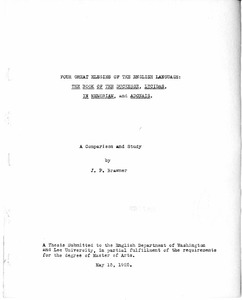| dc.rights.license | No Copyright - United States | en_US |
| dc.creator | Brawner, J. Paul | |
| dc.date.accessioned | 2023-04-21T19:30:24Z | |
| dc.date.available | 2023-04-21T19:30:24Z | |
| dc.date.created | 1925 | |
| dc.identifier | WLURG038_Brawner_thesis_1925 | |
| dc.identifier.uri | https://dspace.wlu.edu/handle/11021/36172 | |
| dc.description | The title page of this thesis indicates that it was submitted "in partial fulfillment of the requirements for the degree of Master of Arts." | en_US |
| dc.description.abstract | . . . Having thus considered the general nature and something of the background of the elegy, let us enter upon I a more direct consideration of the four particular examples which we have taken as representing the greatest
elegiac verse in our own language. It is our purpose to give, as well as we may, a general comparison and study of the four poems as regards the occasions upon which they were written, the sources drawn upon by the writers,
their general form, versification, purpose and spirit, as well as their differing treatments of death and immortality, love and friendship, their uses of nature, etc. We consider each poem a masterpiece which cannot be successfully imitated, due to the author's personality, philosophy of life, and purpose. It is easy to become so enthralled in the beauties and excellencies of one or the other of the poems as to overlook the excellencies of the others. We are to consider briefly four great men, all of whom belong to certain literary groups -- if we may consider Chaucer a complete "school" within himself. Chaucer and Tennyson are farthest apart in point of time, and are the undisputed masters of epochal periods. Milton dominated his time, while Shelley was one of the most conspicuous figures in the romantic group. We should expect to find, then, that the greater portion of the differences in the poems are due, besides the individuality of the authors, to the demands of the times of their composition and to the character of the relationships of the poets to their respective friends, whose deaths occasioned the writing. [From introductory section] | en_US |
| dc.format.extent | 55 pages | en_US |
| dc.language.iso | en_US | en_US |
| dc.rights | This material is made available for use in research, teaching, and private study, pursuant to U.S. Copyright law. The user assumes full responsibility for any use of the materials, including but not limited to, infringement of copyright and publication rights of reproduced materials. Any materials used should be fully credited with the source. | en_US |
| dc.rights.uri | http://rightsstatements.org/vocab/NoC-US/1.0/ | en_US |
| dc.title | Four Great Elegies of the English Language: The Book of the Duchess, Lycidas, In Memoriam, and Adonais; A Comparison and Study | |
| dc.type | Text | en_US |
| dcterms.isPartOf | WLURG38 - Student Papers | |
| dc.subject.fast | Elegiac poetry, English | en_US |
| dc.subject.fast | Book of the Duchesse (Chaucer, Geoffrey) | en_US |
| dc.subject.fast | Lycidas (Milton, John) | en_US |
| dc.subject.fast | In memoriam (Tennyson, Alfred Tennyson, Baron) | en_US |
| dc.subject.fast | Adonais (Shelley, Percy Bysshe) | en_US |
| local.department | English | en_US |
| local.scholarshiptype | Master of Arts | en_US |
